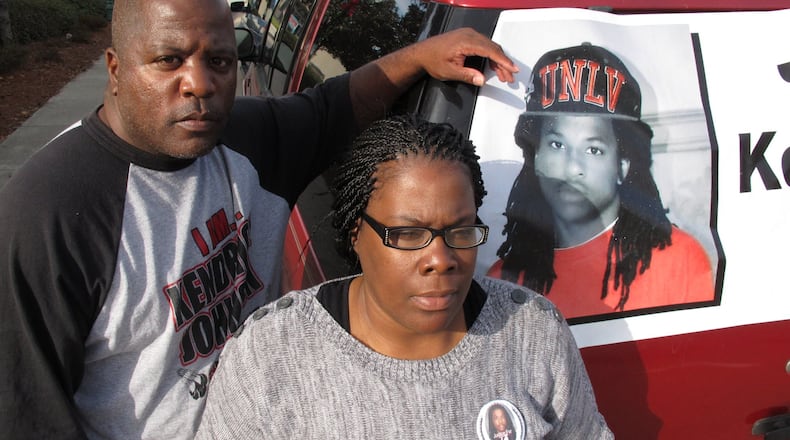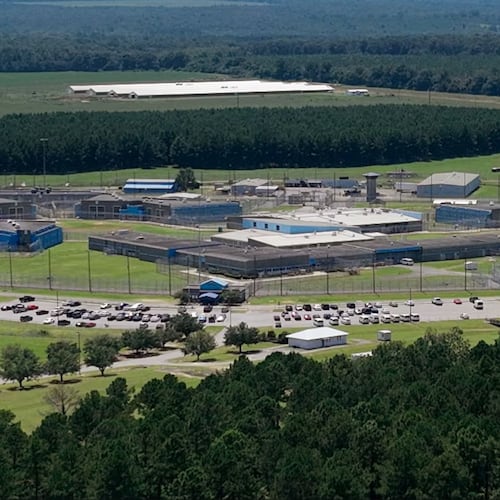Kendrick Johnson’s final hours
Though there were several cameras in Lowndes High School’s old gymnasium, none of them captured Kendrick Johnson’s final moments. What follows is the official account of Kendrick’s death, juxtaposed with questions raised by the teen’s parents and attorneys.
- Why was he on the mats? According to Lowndes County Sheriff's Lt. Stryde Jones, who supervised the investigation, Kendrick stored his gym shoes, which he shared with a friend, underneath the mats — a common practice among students at the high school. Typically, Jones said, Kendrick would tilt the mat to retrieve the sneakers. But on Jan. 10, investigators say, he reached into the mat from above. Jones said he believes Kendrick was running late for a weight training class and, in his haste, reached for the shoe from above instead of pulling the other mats away.
- What about blood on the wall, found not far from where the body was discovered? "We know it wasn't Kendrick Johnson's blood," Jones said. "We did DNA testing. The other thing that was very telling to us is the lack of blood. There was no blood anywhere around the exterior of the mats."
- Was the raw video footage doctored, as alleged by the Johnsons? According to Jones, "They aren't gaps, they are periods of time where there's no activity." The cameras, he said, are motion-activated.
- Why was the one camera pointing in Kendrick's direction out of focus? Jones said school personnel told detectives the camera had gotten hit by a ball some time ago. "It had been blurry for a while."
How we got the story
Reporter Christian Boone has been following the Kendrick Johnson case since last summer. The AJC received the 522-page case file from the Lowndes County Sheriff’s Department last November, along with the corresponding surveillance footage taken of the gymnasium where Kendrick’s body was found. Earlier this month, the newspaper returned to Valdosta and met with the lieutenant who supervised the investigation. We also interviewed civil rights activists and the family of two brothers who’ve been linked to the case by some who believe the teen’s death was not an accident. All along, the AJC has been talking with Kendrick’s family and their attorneys.
From the time Kendrick Johnson’s lifeless body was found inside an upright gym mat in his high school’s old gymnasium a year ago this month, his parents and their attorneys have insisted the 17-year-old was murdered. They’ve since expanded their claim to allege a cover-up perpetrated by law enforcement officials.
“It’s lie after lie after lie that we’ve been told, and we won’t stand for it,” Kenneth Johnson said at a rally commemorating the anniversary of his son’s death.
However, two of the area’s most prominent civil rights activists — organizers of the first major rallies held demanding more transparency from investigators — told The Atlanta Journal-Constitution recently they have since accepted the official police finding that Kendrick accidentally suffocated after he became trapped in the mat that measures about 6 feet high and 3 feet across. Each was sharply critical of how the Johnson family’s lawyers have handled the case.
“You’ve got too many people involved for me to believe there could be a cover-up,” said the Rev. Floyd Rose, longtime president of the local branch of the Southern Christian Leadership Conference. “And who benefits from it? It’s easier for me to believe it’s an accident.”
The AJC traveled to Valdosta on the one-year anniversary of Kendrick’s death in an effort to address lingering suspicions about the case, fueled by social media and the highly charged atmosphere following the trial of George Zimmerman in the death of Florida teenager Trayvon Martin. The newspaper reviewed the case file with the Lowndes County sheriff’s lieutenant who supervised the investigation, and spoke exclusively with a 16-year-old former football teammate of Kendrick’s who has endured a whisper campaign linking him to his friend’s death.
If there was a conspiracy to cover up the real cause of Kendrick’s death, as alleged by his family, Lowndes sheriff’s deputies, the state medical examiner’s office, the GBI, Lowndes High School administrators and at least two teachers would have to be complicit.
Implausible though that may be, the Johnsons aren’t without support. They point to alleged gaps in surveillance footage of the gym where Kendrick’s body was found. Concerns were also raised by the Lowndes County coroner about the crime scene being compromised, though he agreed the death was accidental.
And then there are the findings by a private pathologist, Dr. Bill Anderson, who conducted a second autopsy for the family and concluded Kendrick died from a blow to his neck — like a karate chop — that caused a heart attack.
Two months after Anderson’s report was released, Michael Moore, the U.S. attorney for the Southern District of Georgia, announced he was opening his own investigation into Johnson’s death. FBI agents have been chasing leads in Valdosta ever since, but Moore said he won’t comment until the probe is complete.
A history of racial strife
The SCLC’s Rose was born in Valdosta in 1938, 20 years after 13 African-Americans were killed in retribution for the murder of a white plantation owner by one of his black workers. The murderous rampage generated national outrage after the widow of one of the victims, Mary Turner, and her unborn child were killed by vigilantes when she threatened to have them arrested.
More than 500 black residents fled Valdosta after the murder of Turner and her child.
To this day, there’s mistrust of local officials in the black community. So when Kendrick’s grandfather asked Rose to meet with the family two nights after the teenager’s body was discovered, the veteran civil rights activist didn’t hesitate.
“At the beginning I thought there might be something to it,” said Rose, who opened his church for two rallies in support of the family, one of which was attended by the Rev. Al Sharpton. Rose also raised $10,000 in reward money for information regarding the possible murder of Kendrick. That reward, posted three months ago, expired Sunday and will be returned to the donor. Rose said he was incredulous when Kenneth Johnson asked him not to post the reward.
“I can’t understand why Mr. Johnson was so angry and adamant in not wanting me to offer the reward,” Rose wrote in a letter to the Johnson family’s co-counsel, Chevene King.
King told the AJC Johnson made the request because the family felt they could no longer trust Rose because he had made statements questioning whether foul play had been involved in Kendrick’s death.
Rose, however, said, “If you look at the evidence and don’t let the emotion of the case cloud your judgement, it’s pretty clear what happened. This was an accident, just like they said.”
Former Lowndes-Valdosta NAACP President Leigh Touchton, who called for an “independent, separate investigation” at a rally last April, also has come to believe Kendrick was not murdered. Touchton conducted her own probe at the behest of NAACP District Coordinator Larry Lockey and found little to substantiate the theories offered by the Johnson family.
The tipping point for Touchton came during a conference call last July with about 60 NAACP and civil rights leaders from around the state. Included in the call were Kendrick’s father and King, who were adamant that a cover-up had occurred. According to Touchton, who shared her notes taken during the call with the AJC, they also repeatedly solicited donations for a “KJ fund” set up at a bank branch.
Touchton told the AJC she believed Kenneth Johnson and King provided misleading information.
For instance, she said, King told those on the call that the GBI was refusing to hand over the toxicology reports conducted as part of the initial autopsy.
“And I had that toxicology report he said the GBI wouldn’t hand over,” Touchton said. “It was published by the local newspaper in May.”
Most troubling to Touchton was Johnson’s claim that his son, “KJ,” may have been killed by the son of an FBI agent.
“You can’t just accuse somebody with no evidence,” Touchton said, adding she shared her concerns in a letter sent to Sharpton after the conference call.
Football teammates
They were unlikely friends — one, the son of a truck driver and school bus driver, the other, raised in affluence by an FBI agent and a sales representative for a Fortune 500 company.
Football was the great unifier, as is so often the case in this town of about 54,000 residents located 21 miles north of the Florida state line.
“We were the hardest hitters on the team,” said the 16-year-old boy, whose name is being withheld because of threats he’s received since Johnson’s death. “We were real close.”
About a year and a half ago, the two friends got into a scrape while on a team bus headed to a Lowndes High football game.
“I wouldn’t even call it a fight,” the boy said. “It was pretty much forgotten after the coaches talked to us.”
Though they had made their peace, the Lowndes High student said they started to drift apart after KJ quit the football team. Still, when he heard that it was Kendrick’s body that had been recovered from the gym, he said he was devastated.
Shortly after, the boy’s mother received a call from Sheriff’s Lt. Stryde Jones telling her Johnson’s family believed her son had something to do with KJ’s death. She had already been made aware of a YouTube video posted on Jan. 14, 2013, in which Kendrick’s grandfather, Eddie Tooley, discussed the family’s suspicions, saying, “I was told that boy had something to do with it.”
The accused boy’s mother tried to shield her son from the accusations and, along with her husband, refused to let investigators interview him or her 18-year-old other son, who some were suggesting was involved.
Jones said that, while detectives wanted to interview the brothers, they were never considered suspects.
“We pulled the class attendance records,” he said. “One of the brothers had checked out prior to Kendrick entering the gym (where he was found dead) for a state wrestling tournament. The other brother was in his class, was not tardy. And then we checked the video of the gym and we don’t see him anywhere around the gym area.”
That hasn’t stopped the brothers from receiving a torrent of menacing tweets and Facebook posts, particularly after a national magazine article published in November strongly hinted at their involvement. The article made no mention of their alibis.
When asked by the AJC whether he considered the brothers suspects, King said, “If your question is whether we have eliminated them as possible persons who may have knowledge as to the circumstances leading to or connected with Kendrick’s death, the answer is no.”
Meanwhile, the U.S. attorney’s office has given no indication of when its investigation will conclude.
Kendrick’s parents, in Atlanta Monday to participate in activities commemorating the life of Dr. Martin Luther King Jr., vowed to continue to press for answers.
“We’re here to seek justice for our son,” Kenneth Johnson told reporters.
The family has asked Gov. Nathan Deal to demand a coroner’s inquest, regardless of the federal findings.
Whatever those findings are, it’s unlikely everyone will be satisfied.
“This community is suffering,” Rose said. “The students at Lowndes High School are suffering. I hear from them, and from members of the community, white and black, every day. It’s about all of us, and so we all of us want to know the truth.”
About the Author
Keep Reading
The Latest
Featured




